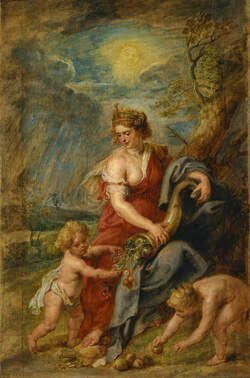 Allegorical depiction of the Roman goddess Abundantia with a cornucopia, by Rubens (ca. 1630). Public domain.From the Google Art Project. As I’ve noted here before, near the end of his life, Rainer Maria Rilke wrote many short poems in French. I find them challenging to translate; I feel as if I’m tramping through a China shop in muddy boots three sizes too large.
I’ve struggled with “Cornucopia” on and off since around 2009. For myself, I’ve come to regard it as a gloss on the familiar language in Malachi 3:10: God will open “the windows of heaven, and pour you out a blessing, that there shall not be room enough to receive it,” a sensation I often experienced in the months after returning to the church. The third stanza is key: if our hearts are already full, the plenty pouring out of the horn will appear as an incessant attack. In the final couplet, the symbol of the hunting horn suggests the attack is intentional, part of the miracle of plenty. As to what Rilke was thinking, the poems begins with a question about the origin of the horn, and the last couplet is ambiguous at best: while English heaven first summons the idea of a divine beyond, and secondarily the sky, French ciel works in the opposite way, I think. Cornucopia by Rilke O beautiful horn, from where do you lean into our hope? Being only the slope of a calyx, pour out flowers, flowers, flowers that, falling, make a bed bursting with the roundness of fruits fully ripened. And it all without end attacks us, a sudden onslaught to punish our insufficient, already full heart. O outsized horn, what miracle by you is given? O hunting horn sounding all things with the breath of heaven! Please direct comments and questions to [email protected]
0 Comments
Leave a Reply. |
AuthorWrite something about yourself. No need to be fancy, just an overview. Archives
July 2024
Categories |
 RSS Feed
RSS Feed